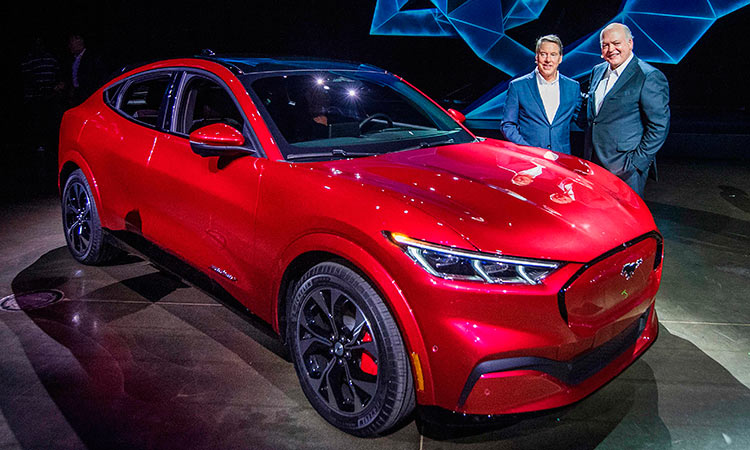
Ford announced a major push into electric vehicles in Europe, vowing to convert its entire passenger car lineup on the continent to electrics by 2030.
Ford will spend $1 billion to revamp its factory in Cologne, Germany and make it a base for production of battery powered cars using Volkswagen’s mechanical framework, said Stuart Rowley, president of Ford of Europe, during an online news conference Wednesday.
The new electric car is to reach the market in mid-2023, and could be followed by a second one there in the future.
The agreement lets Ford take advantage of Volkswagen’s massive investment in electric cars as the industry shifts toward zero-local emissions vehicles.
The Volkswagen framework uses standard mechanical underpinnings such as the battery, wheels and axles that can be adjusted to manufacture different vehicle models.
The moves are part of Ford’s push to offer fully electric or plug-in gas-electric versions of all passenger vehicles in Europe by 2024, with all European passenger vehicles going to full electric by 2030. The company also predicted that two-thirds of its European commercial vehicle sales will be electric or plug-in hybrids by 2030.
“We are going all in on electric vehicles,” Rowley said.
Carmakers in Europe must sell more electrics to meet new, lower limits on emissions of carbon dioxide, the main greenhouse gas blamed for global warming. The new limit, which took effect at the start of the year, is part of the European Union’s efforts to comply with the 2015 Paris agreement on global warming. If manufacturers don’t hold fleet average emissions below the limit, they face heavy fines. Rowley said Ford was in a position to avoid the fines going forward.
The company said commercial vehicles are the key to growth and profitability in Europe, with new products and services through its alliance with Volkswagen and Ford’s Otosan joint venture in Turkey.
The investment, to be made through 2025, is among the most significant Ford has made in more than a generation and “underlines our commitment to Europe and a modern future,” Rowley.
Ford said the investment in the Cologne plant, which employs just over 4,000 workers, comes after its European operations returned to a profit in the fourth quarter of 2020.
The investment is part of Ford’s goal of spending at least $15 billion on electric vehicles from now through 2025.
Meanwhile, Honda Motor Co Ltd will name Toshihiro Mibe, head of its research and development arm, as the new chief executive officer of the company, two people with direct knowledge of the matter told Reuters.
Japan’s second-biggest automaker by sales will announce the decision after a board meeting as early as Friday, the people said, requesting anonymity because the information is not public. Mibe will be confirmed as president and representative director at an annual shareholders’ meeting in June, they said.
Mibe, who is a director at Honda, will replace Takahiro Hachigo, who has held the CEO role for six years. Executive Vice President and Chief Operating Officer Seiji Kuraishi will remain in his post to support Mibe, the people said.
Honda said in a statement on Wednesday that it is not true the company has decided to change its CEO.
It was not immediately clear whether Hachigo would retain a position at Honda with Mibe as CEO.
Mibe, 59, joined Honda in 1987, taking part in engine development as well as managing powertrain and drivetrain businesses. His career includes an operating officer stint in 2014 and he is currently also in charge of intellectual property and standardisation.
After becoming Honda research and development president in 2019, he and Hachigo pushed forward structural reform at the research unit, with electrification in mind.
Hachigo became CEO in 2015, a rare appointment for Honda considering he had not headed the research and development arm as is typical for Honda CEOs.
He spearheaded restructuring plans to simplify and improve efficiency in developing cars, seeking ways to cut model variations and production costs.
During his tenure, the automaker consolidated vehicle and motorcycle development operations, while shifting the research unit’s focus to new mobility and robotics.
Earlier this month, Honda hiked its full-year operating profit forecast 23% to 520 billion yen ($4.91 billion) as it trimmed costs while demand in China and elsewhere gained momentum. Larger peer Toyota Motor Corp also raised its forecast by a bigger-than-expected 54% to a record $19 billion.
Bentley began the year with 50% more orders than the start of last year and built more luxury cars in January than the same time in 2020 as China boosted demand despite challenges from the pandemic, its boss told Reuters on Wednesday.
The Volkswagen-owned brand said it had not faced major disruption from Britain’s exit from the European Union nor from a shortage of semi-conductor chips, which has forced some automakers to halt or reduce production.












